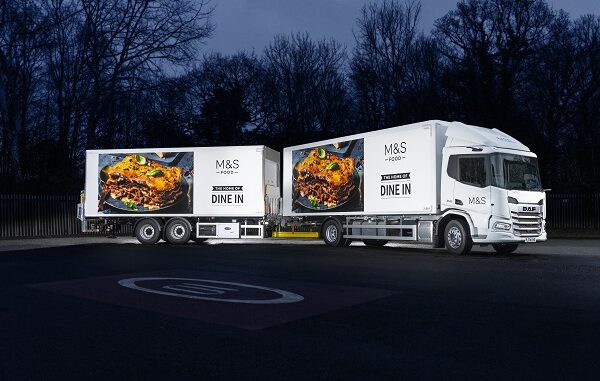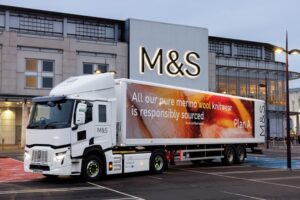
The first two of 13 DAF XD wagon and drag combinations have started work for Marks & Spencer (M&S), each fitted with an innovative hybrid electric refrigeration system from Carrier and bodywork from Gray & Adams, writes Peter Brown.
The Fraserburgh-based manufacturer confirmed that M&S had the first refrigerated electric wagon and drag of its kind in the country, developed in collaboration between both companies, and that it represent a leap forward in sustainability and efficiency for food retail transportation.
The combination of prime mover and trailer is equipped with an electric Carrier fridge on the prime mover unit, powered by the XD 410hp day-cab 4×2 rigid, and should the power be interrupted, the trailer has a ‘small diesel backup tank in case of power failure’.
M&S said the wagon and drag can reduce its fleet carbon footprint and improve efficiency as it replaces the need for two separate rigid vehicles, delivering to two different locations in one trip.
Once uncoupled, the empty trailer can be plugged in to retain its electric connection at the depot, while the prime mover vehicle is used for other deliveries, maximizing productivity.
Over the course of the next three months, M&S plan to make half of its fleet be wagon and drag.
Gray & Adams (Doncaster) sales director Andrew Brown said: “These very latest wagon and drag combinations continue the partnership journey with M&S towards its ultimate target of zero emissions. We continue to work closely with our partner to provide them with one of the most flexible, efficient and carbon-busting fleets in the UK.”
M&S has also added 85 lower emission vehicles to its supply chain logistics fleet, which is part of its Plan A roadmap to Net Zero by 2040.
Five zero emission battery electric HGVs will operate between M&S’ Clothing & Home distribution centre in Welham Green, and 30 stores across the Home Counties.

Head of group transport at M&S Julian Bailey said: “Adapting our logistics network is vital in achieving our Plan A Net Zero ambitions. We’re committed to reducing carbon emissions from our transport and through collaboration we can reduce carbon, save energy and drive operational efficiencies across the business.
“By trialling new vehicle technologies, we’re able to deliver our products, which are sourced and made with care, to our depots and stores with a lower impact on our planet.”
The 42-tonne battery electric Renault trucks will directly replace equivalent diesel trucks, and were delivered under the eFREIGHT 2030 project, part of the UK Government’s zero emission HGV and infrastructure demonstrator programme (ZEHID).
As a founding member of the eFREIGHT 2030 project, M&S said they will gain insight into the performance of battery electric HGVs to demonstrate how they can replace conventional HGVs, which will inform future planning decisions while the retailer continues to implement cleaner burn fuels and lower emission vehicles.
Later in the year, M&S will also take delivery of 30 new vehicles that run on compressed natural gas for its Clothing & Home business, the first retailer to introduce 6×2 CNGs in the UK.
This follows a long-term collaborative trial with Iveco testing the vehicle’s reliability, fuel economy and green credentials.
The retailer also recently introduced 50 4×2 compressed natural gas vehicles to its food logistics business Gist as part of its food supply chain transformation. The compressed natural gas lorry cabs are powered by biomethane, which reduces CO2 emissions by up to 85% versus a diesel engine.
Once these 85 vehicles are in operation, almost 10% of M&S’ total transport fleet will be powered by lower-emission solutions.




